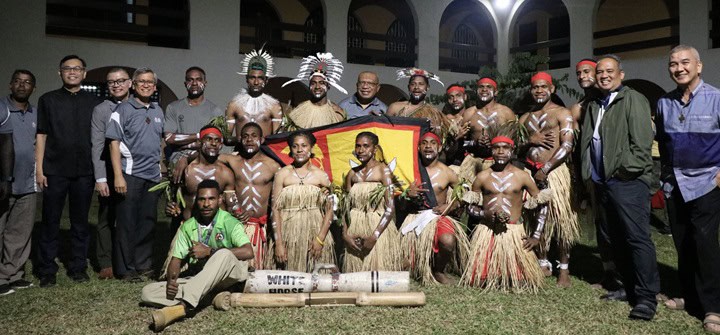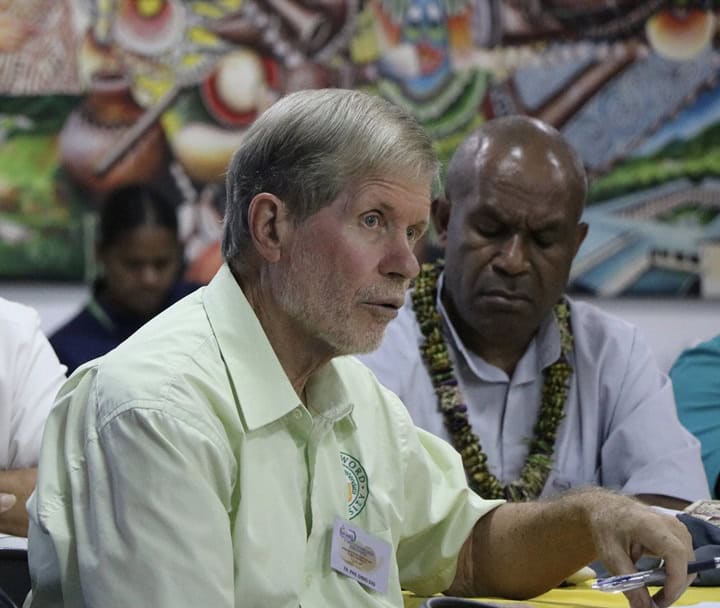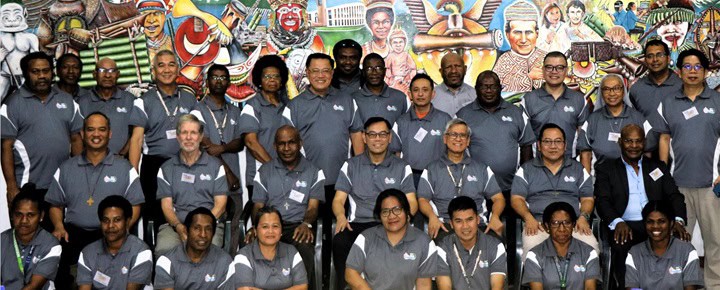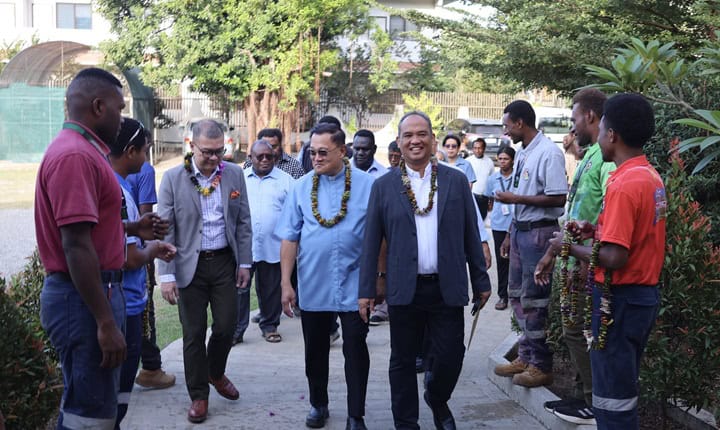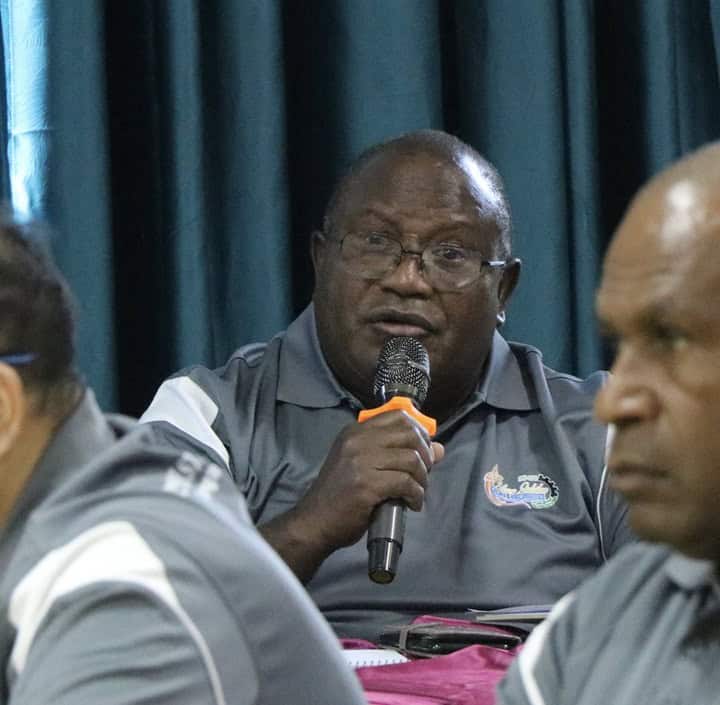(Don Bosco Technological Institute, Port Moresby) – The 2nd Don Bosco Technological Institute (DBTI) Stakeholders Conference was held at the Emmaus Conference Centre from 11-13 July. The conference consisted of a 3-day convention with discussions focused on the theme “Dreaming together for DBTI to be a University”. Invited guests and speakers who were present at the conference were stakeholders from the education, government, and industrial sectors, members of the clergy and from among the Salesians, DBTI Alumni, and fellow DBTI staff that contributed towards the conversations and discussions surrounding the likelihood of DBTI transitioning into an advanced higher educational institution.
After a traditional welcome by DBTI students from the Autonomous Region of Bougainville with dance and bamboo-pipe music, Fr. Greg Bicomong, PGS Provincial and Chairman of the DBTI Governing Board, welcomed all participants, emphasizing the vision, determination, and commitment of the PGS Vice-Province through different Provincial Chapters to pursue a university status for DBTI.
The conference was graced by the presence of the keynote speaker, a prominent figure within the education sphere, Professor Kenneth Sumbuk who was the former Vice-Chancellor of the University of Papua New Guinea and is currently a member of the Oxford University Convocation.
Professor Sumbuk is an avid supporter of the vision of DBTI to transition into a university as he congratulates the Salesians for the milestones it achieved in “filling the gap in the educational needs of the country.” Professor Sumbuk believes that DBTI has already ticked many of the requirements for being a university, but that DBTI would need to assure and maintain quality standards as it responds to the educational crisis that threatens the country.
The Catholic educational institutions were amply represented in the Conference. Bishop Peter Baquero, Bishop of Kerema, and the bishop in charge of education, reminded the assembly that Don Bosco was invited to Papua New Guinea (PNG) not by government and business entities, but by the Catholic bishops in order to educate and evangelize PNG youths through Don Bosco’s brand of education, especially in the field of technical education.
The bishop challenged DBTI to be faithful to the Salesian charism and the Preventive System of education by caring for the less privileged and by discerning the future of DBTI not in answer to a need but in response to God’s call. Supporting comments were made by Dr. Alfred Tivinarlik, a Christian Brother and Principal of the St. Peter Chanel Catholic College, who emphasized the role of the Catholic Church in providing qualified teachers in PNG, as he recognized that much more had to be done to match the educational needs in the country.
Fr. Ronilo Javines represented the IUS, the worldwide association of Salesian higher education institutions. Proposing that DBTI be a benchmark for academic excellence and program diversity as well as for integral ecology, the IUS East Asia Oceania (EAO) Coordinator envisioned DBTI as the cornerstone of educational excellence and innovation among the IUS-EAO institutions. Dr. Gerardo Largoza from De La Salle University (DLSU) Manila represented the International Federation of Catholic Universities (IFCU), of which DBTI is also a member. As Executive Director of Strategic Management and Quality Assurance at DLSU, he shared what DLSU has learned in its 25th year anniversary as a university that can benefit DBTI. As President of Divine Word University in Madang, Fr. Philip Gibbs SVD, shared practical insights on how to transition to a university status with the help of seven areas of strategic planning. Likewise, optimistic sentiments were shared and presented by the President of DBTI, Fr. Ariel Macatangay, on the dream to transition DBTI into an Entrepreneurial University, while explaining that such dreams are attainable by a vision for socio-economic sustainability, transformational leadership, and effective collaboration and research to ensure such plans reach fruition.
Government and civil society officers were also present through the messages of Kevin Kalis, Assistant Director at the National Training Council, Samson Wangihomie, Chairman of the Teaching Service Commission, and John Tul of the PNG Education Advocacy Network, as well as the participation of Dr. Kilala Devete-Chee from the National Research Institute.
Some successful DBTI alumni shared their insights in the persons of Dr. Jerome Oko, Administrator at the Divine Word University, Port Moresby campus, Omar Palaming, Founder and CEO of PhilIT System in the Philippines, Godfrey Morisa, Owner and Executive Director of GMT Automation and Mr. Leslie Brown, representing the Corporate Bosco, the federation of alumni in Papua New Guinea and Solomon Islands.
A unique feature in this conference was the involvement of three educational leaders from other parts of the world, who made their presentations via Zoom online platform. The following presented various roadmaps from their respective institutions for DBTI to learn from: Br. Mario Olmos, Rector at Don Bosco University in Salvador, Fr. Stephen Mavely, Founder and former Vice-Chancellor of Assam Don Bosco University in India, and Dr. Peter Bamkole, Deputy Vice-Chancellor for Administration at the Pan-Atlantic University in Lagos, Nigeria.
The whole process was ably facilitated by the Conference Moderator, Fr. Dindo Vitug, Chancellor of the Don Bosco Education Centers in the North Philippines and the Executive Director of Don Bosco-One TVET Philippines. Through his accurate synthesis of the entire proceedings, Fr. Dindo was able to lead the participants to jointly express their views on the future direction for DBTI as a university and practical resolutions that can lead to it.
Most of the participants envisioned DBTI as a university that is
1) faithful in its Salesian identity
2) exemplary in quality and research
3) appreciated for its socio-economic impact.
In order to achieve this dream, DBTI would need to focus primarily on
1) assembling a dedicated core group
2) working seriously for its institutional and program accreditation
3) building up and investing on human resource capacity
4) Strategically engaging with trusted stakeholders. All the participants also experienced the hospitality of DBTI through a gala night of abundant pizza and cultural presentations from four provincial groups, and a tour to Varirata National Park and the Adventure Park that featured the famed bird of paradise.
Source: Bosco Link

